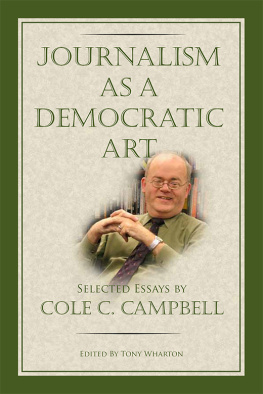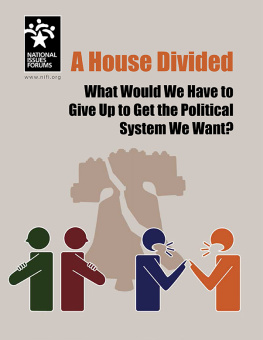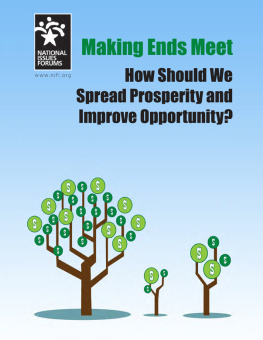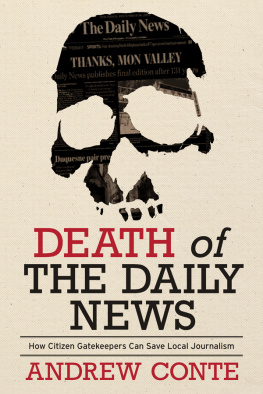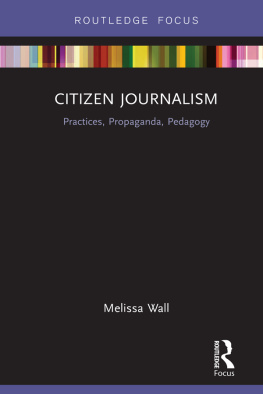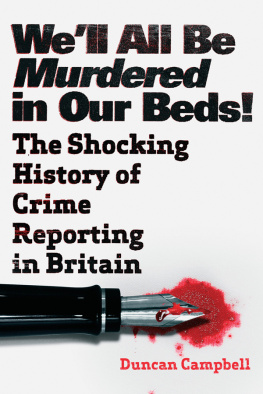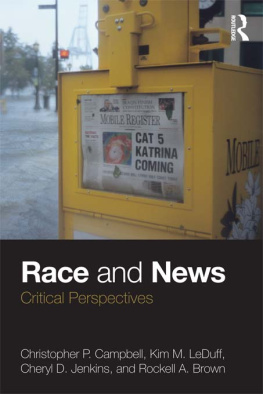2012 by the Kettering Foundation
ALL RIGHTS RESERVED
Journalism as a Democratic Art: Selected Essays by Cole C. Campbell is published by Kettering Foundation Press. The interpretations and conclusions contained in this book represent the views of the author. They do not necessarily reflect the views of the Charles F. Kettering Foundation, its directors, or its officers.
For information about permission to reproduce selections from this book, write to:
Permissions
Kettering Foundation Press
200 Commons Road
Dayton, Ohio 45459
This book is printed on acid-free paper.
First edition, 2012
Manufactured in the United States of America
ISBN: 978-0-923993-40-5
Library of Congress Control Number: 2012930719
_______________
Cole Charles Campbell (Aug. 10, 1953 Jan. 5, 2007) was a leading voice in American journalism for more than 20 years.
At the time of his death, he was dean and professor at the Donald W. Reynolds School of Journalism and Center for Advanced Media Studies, University of Nevada, Reno, Nevada. He served as a director of the Kettering Foundation, Dayton, Ohio, and as a fellow at the Poynter Institute for Media Studies, St. Petersburg, Florida. During his newspaper career, he was editor-in-chief, St. Louis Post Dispatch, St. Louis, Missouri; editor, the Virginian-Pilot, Norfolk, Virginia; associate managing editor, Greensboro News & Record, Greensboro, North Carolina; assistant city editor, the News & Observer, Raleigh, North Carolina; editor, the Daily Tar Heel, University of North Carolina, Chapel Hill, North Carolina; and Pulitzer Prize juror, 1993, 1994, 1997, and 1998.
He is survived by his widow, Catherine L. Werner and their son Clarke; a daughter, Claire, by a previous marriage; and his sisters Constance C. Brough and Catherine J. Campbell.
_______________
FOREWORD:
FIGHTING THE GOOD FIGHT
T HE MOMENT I THINK OF COLE CAMPBELL, a smile comes over me. He was a delightful persona savvy conversationalist, instantaneously ready with an insightful quip, a sharer of anything he had. And he had so much to share.
But then, quickly, something deeper comes over me. For what I loved about Cole, and why I came to so deeply admire and respect him over the years, is that he was always in dogged pursuit of something meaningful, something vital, about our individual and collective lives.
We live in a time when so many of us are trying to run harder and faster just to keep up; when we feel unrelenting pressure to focus on our daily to-do lists; when our own urge within ourselves to step forward in life can be discarded, denied, or denigrated by others.
And yet, there was Cole Campbell, in dogged pursuit of some larger mission in life.
In this collection of his writings, you will come across some of those pursuitshis thoughts about the contours and public purpose of knowledge, the role of journalism and the journalist in society, and conceptions of public life and community, among others.
As a society, we need these writingsperhaps even more now than when Cole originally wrote each of them. For our politics has reached new levels of toxicity. Public discourse writ large is driven by acrimony and divisiveness. There are few institutions or organizations or leaders Americans trust nowadays. In many respects, many of our communities lack the very capacitiesthe leaders, organizations, networks, and normsnecessary to create the kind of community that reflects peoples shared aspirations and focuses on their chief concerns.
And many communities lack the healthy information environments people need to engage, become informed, and work together.
Journalism and journalists are pivotal in this changing environment. In peoples daily lives, they are struggling to see and hear one another, especially those different from themselves. Amid the deafening noise of public life, there is the hope to make sense of the issues and shifting conditions around them. And people long for a sense of possibility; they are tired and wary of all the negativity and gridlock, and they want to hear different perspectives on ways to move ahead.
These are basic human yearnings. They involve how people see themselves and their relationship to others and the ability to form effective and resilient communities together. These yearnings are about how people bring themselves to the public square and engage and connect with others.
Basic human yearnings: these are the matters of Coles work and life.
But his work was not always easily understood or embraced by others. Still vivid are my own memories of watching individuals and crowds of people listen to Cole speak about such pursuits. Some thought that he was operating outside the nitty-gritty of reality, others that his head was up in the clouds. While a fair share of his fellow journalists applauded his efforts, many more scratched their heads and wondered aloud about what all the talk and debate was about. It wasnt always easy to bring Coles ideas down to ground level, or to readily make the implications clear, or to translate them into immediate, practical use.
Cole knew all this. And yet he kept going.
Over the years his own momentum and trajectory and influence would grow and deepennotwithstanding some of the hard personal and professional falls he had along the way, many in plain sight for others to see.
But each time he got back up.
His pursuitsthose matters of the heart and mind that drove him at his corewerent about empty ruminations, or idle notions, or lofty ideals. Nor did they spring from some youthful naivet about life, or fanciful vision of a society untethered from reality.
Cole insisted that his work be practical and relevant.
Simply put, Coles work was about people, their lives, and the relationship of his profession to them. He did not see himself as a passive bystander in these pursuits. He never envisioned himself as a detached observer. He always had skin in the game.
For Cole, this was a fight.
It was a fight about the kind of society people want to create together. In his mind, as in my own, this was a process that could happen only when people came together to identify their common concerns; to argue and debate and deliberate on the choices they face, and the differences among us, even the deep-seated conflicts. It was about people in communities determining for themselves how they wished to move ahead. For Cole, democracy was not for the faint of heart, or for mere cheerleaders, but for active and engaged citizens.

